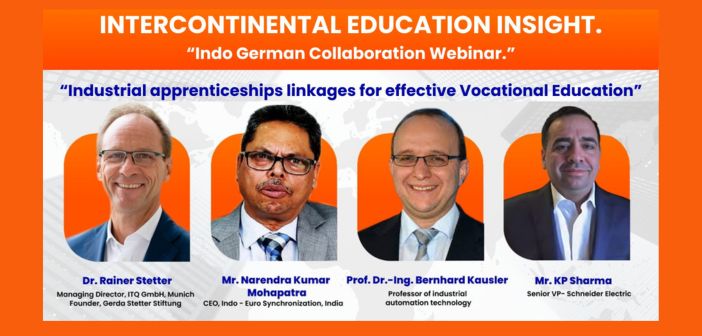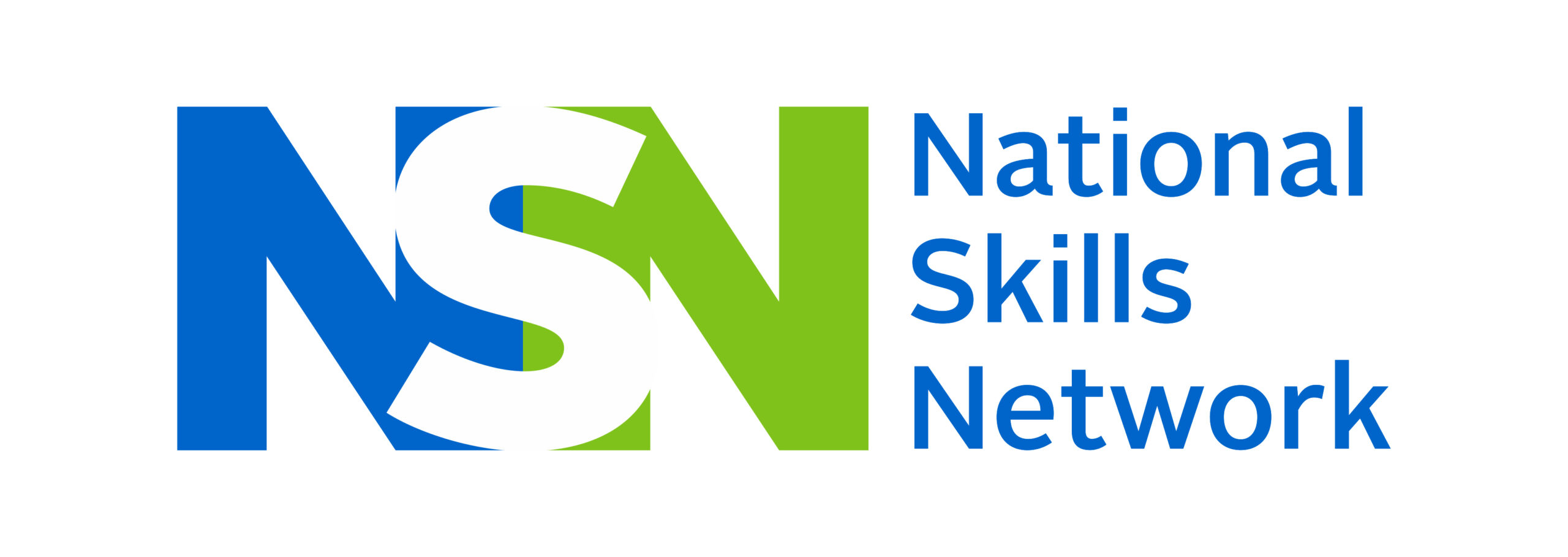The German Varsity and Indo Euro Synchronization (IES) organized the second webinar on the topic “Industrial apprenticeships linkages for effective Vocational Education” in partnership with National Skills Network (NSN) on September 29th, 2023.
This is the second webinar from the series of five webinars, which aim to discuss action plans to improve the quality of education and international education and employment opportunities for Indian students.
The eminent speakers for the webinar were Dr. Rainer Stetter, Managing Director, ITQ GmbH, Munich Founder, Gerda Stetter Stiftung; Mr. Narendra Kumar Mohapatra, CEO, Indo-Euro Synchronization India; Prof. Dr.-Ing. Bernhard Kausler, Professor of Industrial Automation Technology; Mr. KP Sharma, Senior VP – Schneider Electric. Dr. Madhuri Dubey, Founder and director, National Skills Network (NSN), moderated the webinar.
The panel discussion focused on,
- TVET System in Germany and its effectiveness with industry involvement through apprenticeship
- Less effective vocational education in India as compared to other countries
- Industrial apprenticeships can be effectively integrated into vocational education programs.
- Strategies for vocational schools and colleges to ensure that apprenticeships align with the evolving needs of industries/employers.
Industrial apprenticeships linkages for effective Vocational Education
Mr. KP Sharma recently shared insights on industry-academia collaboration in India versus apprenticeship programs in countries like Australia, Japan, Korea, and Indonesia. In India, apprenticeships are in place, with Schneider Electric actively engaging in government schemes like National Apprenticeship Promotion Scheme (NAPS). However, there’s room for greater integration, improved program duration, and curriculum refinement.
To enhance the effectiveness of India’s apprenticeship programs, we can look to successful models in countries such as Germany, Italy, France, the US, and Singapore. Achieving this improvement requires close collaboration between industry and government to bridge the existing gaps and create a more robust system for nurturing talent and skills.
Mr. Rainer Stetter has shared his perspective on the policy framework in Germany, emphasizing how government policies effectively foster collaboration between industry and academia, particularly in vocational training. “In Germany, the fusion of academic and industrial practices, especially in vocational training, is not merely a matter of policy; it’s deeply ingrained in our culture. This approach involves individuals spending four days working in a company and one-day attending school, and it’s so deeply embedded in the fabric of German life that what might appear unique to others is entirely commonplace for Germans.”
Mr. Rainer Stetter advocates for closer collaboration between industry and academia, as it is fundamental to the success of Germany, particularly for the small and medium enterprises that rely on skilled professionals without the need for formal higher education. This collaboration should not be viewed as a mere policy but rather as a way of living and working that can benefit societies.
Prof. Dr.-Ing. Bernhard Kausler emphasized a crucial policy in Germany, stating, “We have the freedom of research and teaching, defining what’s necessary, and closely aligning academia with industry needs, whether in universities or vocational education.” He stressed the close partnership between educational institutions and industries in determining the most important topics. This collaboration is deeply ingrained in Germany, with academia and industry working in synchronized harmony. To a large extent, the government entrusts these matters to us, allowing us to exercise our autonomy.

In Germany, the integration of industry into education is part of our DNA, and academia is open to such partnerships. This synergy is well-aligned with the education system. In contrast, many other countries need help with such integration, as their systems operate differently. India, for instance, has only embraced a more flexible and incentivized approach to apprenticeships in the past eight to ten years. India’s industrial landscape is comprised of micro, small, and medium enterprises (MSMEs). Efforts are underway to educate these smaller companies about the benefits of having at least one or two apprentices. The system also involves partners such as training organizations, academic institutions, ITIs (Industrial Training Institutes), and collaborations with German organizations like GIZ, which contribute to the development of the system.
Mr. Narendra Kumar Mohapatra discussed the challenges related to accepting apprenticeships as a concept in India, as opposed to internships, which are more widely recognized. He brought attention to key issues, particularly the social aspects of vocational education.
He outlined a few critical points: “While we engage in discussions with countries and companies known for their successful apprenticeship models, we face a significant challenge in India. The quality of students entering vocational education institutions is considerably lower. There is a prevalent desire for formal degrees in India, but vocational schools are often overlooked. Few believe pursuing vocational training can lead to a fulfilling career and livelihood. This has resulted in a situation where we attract students from different backgrounds into vocational education. Consequently, industries has less faith in the quality of education from vocational institutions, hindering collaboration in the manner seen in other countries.”
Mr. Narendra Kumar Mohapatra also emphasized the need for rigorous assessment and monitoring to ensure quality compliance during the apprenticeship process. He concluded, “To address these issues in India, we must address multiple aspects simultaneously. Improvement can only be achieved when students’ input quality and societal perceptions towards vocational education undergo positive transformations.”
Key parameters of a successful apprenticeship program
Mr. Rainer Stetter highlighted several key parameters for a successful apprenticeship program, drawing from the German model:
- Continuity:Apprenticeships in Germany span three years, allowing individuals to progress from low-level tasks to more advanced ones. This structured, continuous learning process is highly valuable.
- Career Growth:Apprentices have the opportunity to advance in their careers steadily. The ability to move up the ladder and take on more responsibilities is a crucial element of a successful program.
- Proper Training:Training is comprehensive and of high quality. Apprentices receive a well-rounded education and practical experience, equipping them with the skills needed for the industry.
- Long-Term Perspective:The extended three-year apprenticeship period provides a robust foundation for learning and development, preparing individuals for a fulfilling career.
The panel discussion was succeeded by a Q and A session, during which the speakers addressed several significant questions from the audience via the live chat.
Also read: Intercontinental Education Insight – Indo German Collaboration Webinar – A Report
The panellists have offered various insights on apprenticeship programs. A comparative analysis between two countries, Germany, an apprenticeship leader, and India, where certain concepts are emerging, shows how they approach these ideas in their respective ecosystems. Germany’s cultural integration of apprenticeships, deeply ingrained within its system, has advanced. Meanwhile, India is embracing these concepts, and the need for innovation and the development of new approaches is becoming apparent. This underscores the ongoing evolution and adaptation of apprenticeship programs in different parts of the world.
If you wish to know more about the Indo German Collaboration Webinar, please write to executive@indoeurosync.com



